Israel Targeted Iran’s Nuclear Program On Its Soil – Ex-Spy Master
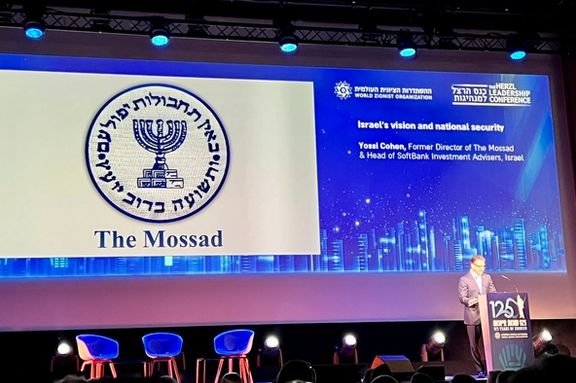
Former Mossad director Yossi Cohen says Israel carried out “countless operations” against Iran’s nuclear program when he led the spy agency.

Former Mossad director Yossi Cohen says Israel carried out “countless operations” against Iran’s nuclear program when he led the spy agency.
Speaking during an event in Switzerland’s Basel on Monday to mark 125 years since the First Zionist Congress, Cohen denounced the emerging nuclear accord between Iran and world powers, saying that Israel “will continue to do whatever needs to be done” to prevent Iran from acquiring nuclear arms if a deal is signed.
“Without going into too many details, I can tell you the Mossad had many successes in the fight against Iran’s nuclear program,” he said, adding, “We operated around the world and on Iranian soil itself. In the very heartland of the ayatollahs.”
He mentioned as an example the 2018 operation to snatch a trove of Iranian documents -- including draft designs for a nuclear warhead -- which proved Tehran has lied about the military dimensions of its atomic program. "The Iranian regime is lying to the whole world, and we proved it when we brought thousands of documents from the Iranian archives, documents that proved that the Iranians lied to the International Atomic Energy Agency."
“We can never allow a regime that calls for our destruction to get its finger on the nuclear trigger,” Cohen warned.
Earlier in the day, Israeli President Isaac Herzog urged the IAEA to continue its probe of Iran, after President Ebrahim Raisi threatened Israel and said Tehran won’t return to the 2015 nuclear deal unless the UN watchdog stops its investigation into uranium traces found at unexplained sites. “The IAEA’s independence is critical. It should be strictly adhered to, including its ability to investigate violations of nuclear developments in Iran,” Herzog said in Bern at a press conference with Swiss President Ignazio Cassis.
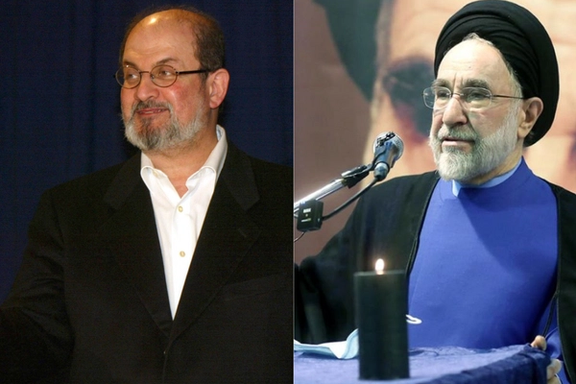
A new report has revealed that Iran’s former President Mohammad Khatami had a role in issuing the fatwa by Islamic Republic’s founder Rouhollah Khomeini against author Salman Rushdie.
According to a report by BBC, Khatami – then a minister -- held a meeting with two Pakistani-British Islamic scholars, Kalim Siddiqui and Ghayasuddin Siddiqui, just hours before Khomeini issued the fatwa, a formal proclamation that called for the murder of Rushdie. Before the February 1989 decree, Iran had largely ignored the Satanic Verses, the controversial book that brought about 30 years of death threats for the novelist.
The two Sunni clerics had arrived at Tehran’s Mehrabad Airport to get home to the UK after attending a conference in the Iranian capital to mark a decade since the country's Islamic Revolution. Inside the airport, they bumped into Khatami -- who asked to have a private word with Kalim. "They went to a corner and chatted," Ghayasuddin later explained in the BBC's 2009 documentary, recounting that "He (Khatami) was asking my view about Salman Rushdie - and I told him, 'You know, something drastic has to happen.'"
Khatami then met with Khomeini, and a few hours later the fatwa was issued, not only against Rushdie but also its publishers, editors and translators, reportedly without Khomeini even reading the novel. "I call on all valiant Muslims wherever they may be in the world to kill them without delay" it read.
Kalim later said he believed he may have been "partially responsible" for the fatwa. In 2019, Ed Husain, a writer on religion and extremism, said that Khomeini had not been minded to do anything about Rushdie; it had been the British imam who had urged the autocratic political and religious leader that he "must do something for the Muslims".
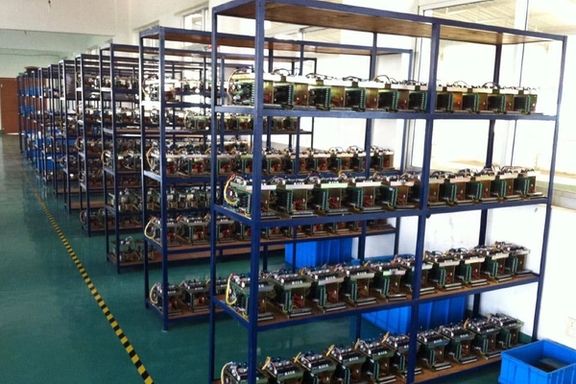
Iran has officially approved the use of cryptocurrency for imports as a measure to circumvent US sanctions imposed on its finance and banking sector.
Industry, Mines and Trade Minister Reza Fatemi Amin said on Monday that the regulations for using cryptocurrencies instead of dollar and euro was finalized by the administration on Sunday.
"All the issues related to crypto-assets, including how to provide fuel and energy, and how to assign and grant licenses were devised," he added.
The use of cryptocurrencies in imports is one of the ways to circumvent sanctions because cryptocurrencies are not traded through normal channels such as banks and it is very difficult to track them.
Earlier in the month, Iran made its first official import cryptocurrency order, worth $10 million, as a test run for allowing the country to trade through digital assets that bypass the dollar-dominated global financial system and to trade with other countries similarly embargoed by US sanctions, such as Russia.
"By the end of September, the use of cryptocurrencies and smart contracts will be widely used in foreign trade with target countries," said Alireza Peymanpak, a deputy Iranian trade minister who leads Iran’s Trade Promotion Organization (TPO).
Iran has a complex relationship with cryptocurrencies, which have helped hide various kinds of illicit trades banned by US and other European sanctions but creating them is highly energy-intensive. In 2019, Iran’s central bank banned trading of cryptocurrencies inside the country but the government allowed the use of cryptocurrencies like bitcoin to pay for imports.
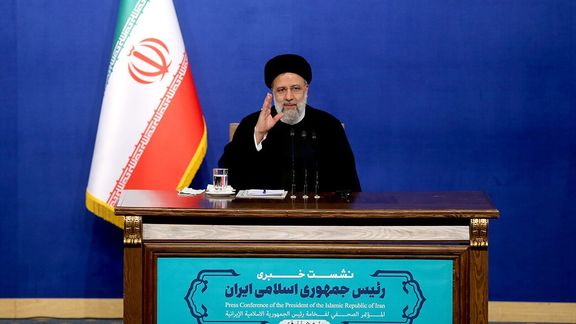
Iran’s President Ebrahim Raisi said at a briefing Monday that he has no plans to meet with The US President at the UN General Assembly in New York in September.
“I said no at the previous briefing in response to a similar question and I'm repeating it again: meeting with [the US President Joe] Biden has no benefit for Iran or the Iranian people. There is no plan for such a meeting and there will not be in the future,” the Iranian president said at the briefing in Tehran attended by local and foreign reporters.
Elsewhere in his briefing,Raisi underlined that Tehran and Beijing are both determined to broaden their relations, especially in commercial and economic areas and said Iran will not allow bilateral ties with China to be affected by globaland other issues.”
Referring to the 25-year comprehensive cooperation agreement between the two countries, he stressed Tehran’s determination to implement the deal.
Raisi also reiterated the importance of Iran's presence in the Shanghai Cooperation Organization (SCO)and said corporation with its members will help Iran connect to Asia’s economic infrastructures and have its fair share of trade in the region.
In response to questions regarding the nuclear issue, Raisi said no one can “deprive the Iranian nation of its inalienable right to access peaceful nuclear technology.”
The Iranian president also said Iran has managed to access some of its frozen assets under the US sanctions and demanded the release of the rest of assets frozen abroad. Iran claimed in July that it had received some funds frozen in Iraq.
Raisi said the Iranian team will not leave the negotiating table in the talks on reviving the 2015 nuclear deal, officially known as the Joint Comprehensive Plan of Action (JCPOA), but reaching an agreement, hinges on the settlement of safeguards issues between Iran and the International Atomic Energy Agency (IAEA).
“Negotiations are for the sake of removing the sanctions. Those who abandoned their commitments should return and fulfil their obligations. Our emphasis in these negotiations is on the removal of sanctions.”
Referring to Israel’s threats against Iran, he said that the assassinationof the country’s nuclear scientists was aimed at stopping it runs progress in nuclear technologyand added that Israel is not capable of “protecting itself against Palestinian people’s stone-throwing, let alone their precision strike missiles.
Commenting on Tehran relations with neighboring countries and allies Raisi said Tehran and Moscow enjoy strategic cooperation in various areas. "Our cooperation with Russia is strategic and is defined in economic, commercial, energy, air and space fields, and many other issues,” he said, adding that the issue of the North-South Corridor is on the agenda of talks with Moscow.
Raisi noted that negotiations between senior representatives from Iran and Saudi Arabia have continued in the Iraqi capital Baghdad to resolve differences and to restore diplomatic relations and described relations between Tehran and Ankara as good. “Turkish President Recep Tayyip Erdogan has promised to pursue joint water diplomacy with neighbors,” he said.
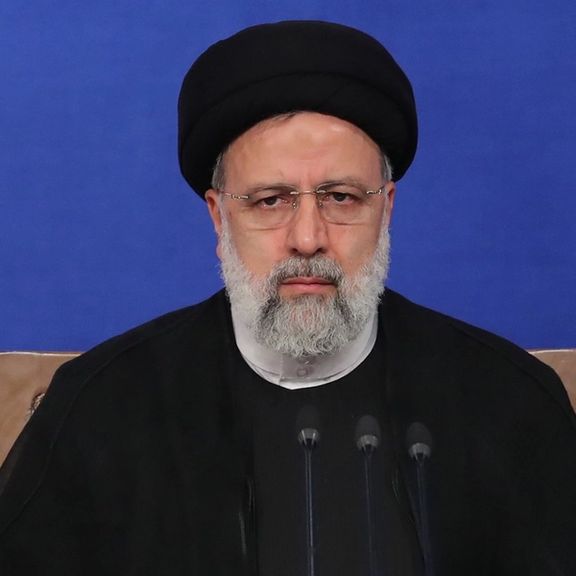
Iranian President Ebrahim Raisi says if Israel makes a decision to act against the Islamic Republic, it will not have enough time to implement it before anything is left of the country.
During a press conference on Monday, Raisi noted that Israel did not want Iran to acquire nuclear technology in the first place, “but this knowledge has become native to our country and it cannot take it away from us.”
Referring to Israeli efforts to sway the West from returning to the 2015 nuclear deal, he said that their efforts will ultimately turn out to be in vain, adding that “the assassination of nuclear scientists was to stop the nuclear program, many sabotage operations were also meant to stop us but we did not stop; They will not stop us and they cannot stop us from getting this absolute right.”
Reiterating threats against Israel, Raisi said that “the Zionist regime should see that it cannot even protect itself from the resistance groups in Palestine with its threats.” Israel used to face “the Palestinians' stones” but now they have to deal with “their precision-guided rocket launchers,” he noted. “Can they keep themselves safe? Can the Zionists defend themselves against Gaza despite the fact that its oppressed people are under blockade?”
Iran, which uses the term ‘resistance groups’ to refer to its proxy forces in the region, finances and arms Palestinian and other militants against Israel and Western interests.
Israel has stepped up efforts to dissuade the US from reviving the landmark nuclear pact, officially known as the Joint Comprehensive Plan of Action, or JCPOA. The director of Israel’s intelligence agency Mossad is set to travel to Washington DCnext week following trips by National Security Adviser Eyal Hulata and Defense Minister Benny Gantz.
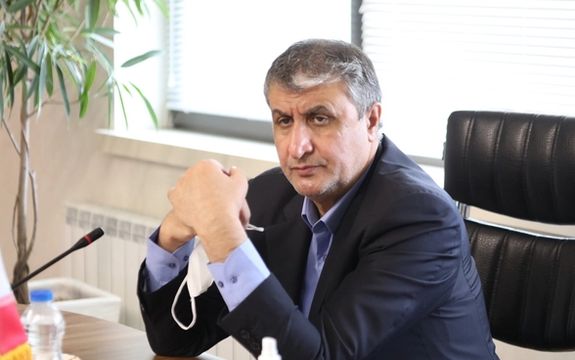
Iran's president and its nuclear chief have once again demanded an end to the IAEA probe into Iran’s past secret work, before a new JCPOA deal is concluded.
The UN nuclear watchdog, the International Atomic Energy Agency (IAEA) has been demanding proper explanations from Iran regarding uranium traces found at several sites used in its nuclear program before 2003. Reports in recent weeks have indicated that Tehran wants the closure of this probe before a deal is concluded to revive the 2015 nuclear deal, JCPOA.
Iran's President Ebrahim Raisi and Mohammad Eslami, the head of the Atomic Energy Organization of Iran speaking on Monday said that the IAEA probe must be closed before an agreement is reached to revive the JCPOA.
Eslami speaking during a provincial visit said that “The essence of the JCPOA negotiations is the dismissal of these charges and denying an excuse to the enemy that constantly” brings up the issue.
The United States and its European allies are not willing to reverse a resolution they spearheaded in June at the IAEA Board of Governors to demand answers from Iran.
Last week, Eslami doubled down on his demand after a senior US official told Reuters on August 22 that Iran had shelved its demand to end the probe. It is not clear to what degree the IAEA dispute would be detrimental to an agreement that seems to be far advanced.
The White House National Security Council Coordinator John Kirby on Sunday said, "We are certainly closer today than we were about two weeks ago thanks to Iran being willing to concede on a couple of major issues. But There are still gaps that remain between all sides.”
Meanwhile, the Israeli media on Sunday published what it said was the timeline of the JCPOA restoration as proposed by the European Union, which acts as a mediator between Iran and the United States.
The process envisages a 165-day period for the full restoration of the JCPOA, but before that, the US and Iran are supposed to reach a deal to free Western prisoners in exchange for freeing Iranian funds frozen because of US sanctions.
The 165-day period starts with Day Zero, when President Joe Biden would rescind three executive orders related to sanctions and other measures against Iran. This will open the way to first unfreeze $7 billion held by South Korean banks.
Iran would reduce its uranium enrichment from 60 percent to 20 percent and will hold on to the fissile material it already has.
The Biden Administration will send the deal to the US Congress within five days in the framework of the Iran Nuclear Review Act (INARA) of May 2015, which requires any deal lifting Iran sanctions to be reviewed by the House of Representatives and the Senate.
Short of formal treaty requiring Senate ratification, this is what the Biden Administration hopes to offer political cover for the deal, but its passage in the Senate is doubtful given the current 50-50 split in the chamber. If it does not pass Biden can use his presidential veto.
The Jerusalem Post in a report on Sunday wrote, “There is, however, still a chance of a majority opposing a deal, amid growing concerns in Washington that Russia will use Iran as a conduit to avoid sanctions.”
Sixty days after Day Zero, the UN Security Council will be notified of JCPOA restoration, and the US would grant a one-time permission to Iran to export 50 million barrels of oil it has stored.
This information confirms with what was leaked in Tehran that Iran International reported on August 19.
By this time Iran would stop enriching above 5 percent, and “would have to fulfil its commitments to the IAEA regarding its ongoing investigation” into uranium traces found at undeclared sites.
Therefore, Iran’s insistence that the IAEA probe should be dropped shows there is still no final agreement on this issue.